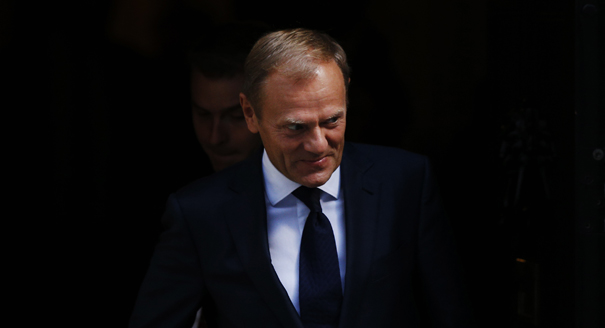All European Union leaders face a choice. They either allow the United States and Russia to divide the bloc—and even destabilize it—or they realize that they have to complete a project begun sixty years ago in Rome.
That project, supported by the United States, was about putting an end to centuries of war, conflict, and distrust on the continent of Europe.
The project not only survived. The EU flourished. It became an incredible attraction and a success story for those countries then under the communist yoke. Europe, supported by the United States, was about freedom, prosperity, safety, and peace. All four were anchored on integration.
The specter facing all European leaders today is that for the first time since 1945, an American leadership no longer sees the value of Europe. If anything, U.S. President Donald Trump wants to destabilize the EU by encouraging its members to follow Britain in leaving the bloc.
“The change in Washington puts the European Union in a difficult situation; with the new administration seeming to put into question the last 70 years of American foreign policy,” Donald Tusk, president of the European Council, wrote in a letter to EU leaders.
This letter is worth reading. It puts paid to myths and deceptions held by several EU leaders and populist politicians that their countries would be better of if the EU disintegrated.
That would “not lead to the restoration of some mythical, full sovereignty of its member states, but to their real and factual dependence on the great superpowers: the United States, Russia, and China,” wrote Tusk.
Is that really what Viktor Orbán, the Hungarian prime minister who will host Russian President Vladimir Putin on February 2, or France’s National Front leader Marine Le Pen, or British Prime Minister Theresa May want?
Don’t EU leaders now finally understand that Europe faces instability, which in itself is so dangerous to even contemplate, if they do not rise to the challenges that Trump and Putin are throwing at Europe?
European leaders can respond in five simple ways.
First, stop treating integration as a nasty, elitist project. Political and economic integration must be now pursued and quickly. Germany, France, and the other eurozone countries have a responsibility to push ahead. Whether or not all EU members support more integration or a two-speed Europe, integration should be made a priority.
Second, all countries that joined the EU signed up to its values, particularly the rule of law and checks and balances. These values are being made a mockery of by the Polish, Hungarian, and Romanian governments.
Just in these past few days, the new government in Bucharest introduced a decree that would effectively halt an anticorruption drive. Demonstrators have taken to the streets to protest. This is not enough. They need support from other EU leaders.
Such persistent breaches of the rule of law can be stopped by suspending the voting rights these governments enjoy in the European Council, which represents all the member states. The EU treaties permit such a sanction.
And while on this subject, why should EU taxpayers disburse tens of billions of euros to modernize the infrastructure of countries whose governments flout the EU’s commitment to the rule of law and values?
Third, much has been written about the need for a credible EU defense and security policy. Europe’s weak external borders, the terrorist threat, and the weakening of America’s security commitment to Europe are surely enough reasons for European leaders to take their defense seriously. And even if even if Trump does commit himself to continuing America’s security umbrella over Europe, that itself is not enough to deal with the internal and external threats the EU faces.
Fourth, speed up trade agreements instead of allowing them become hostage to various lobbies in the member states.
Trade is the prerogative of the European Commission not the member states. The spectacle of a regional parliament in Belgium trying to hijack the recent trade deal between the EU and Canada should be a warning against protectionism.
Tusk is right about trade. The EU should not abandon its role as a trade superpower which is open to others. But it’s more than that. It is, as Tusk wrote, about defending the international order based on the rule of law.
Finally, the EU needs to shore up Ukraine and fast. This is Europe’s strategic neighbor. What happens there affects Europe’s security and its values. The recent surge of fighting in eastern Ukraine that was begun by Russian-backed fighters could be Putin’s way of testing his relationship with Trump.
Either way, European leaders should not waver or delay in their reaction to events in Ukraine. The sanctions on Russia should be rolled over if not intensified. Economic and political assistance to the Ukrainian government should be increased and coupled with more support to fight corruption.
All the above proposals are not rocket science. What they require is political will and communication. Words at summits and worthy speeches have run their course. If Europe’s leaders do not realize what is happening across the pond and to the east, it is they who will precipitate the end of this great post-1945 project.








